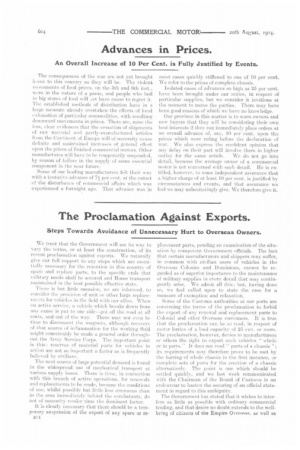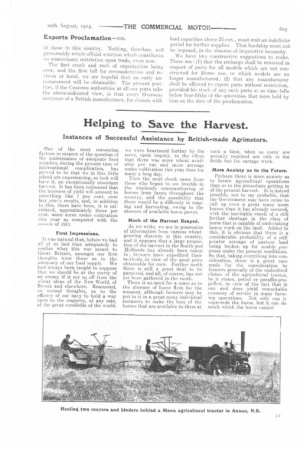The Proclamation Against Exports.
Page 6

Page 7

If you've noticed an error in this article please click here to report it so we can fix it.
Steps Towards Avoidance of Unnecessary Hurt to Overseas Owners.
We trust dart the Government will see its way to vary the terms, or at least the construction, of its recent proclamation against exports. We naturally give our full support to any steps which are essentially necessary for the retention in this country of spare and replace parts, to the specific ends that military needs shall be secured and Home transport. maintained in the best possible effective state.
There is but little oQeasion, we are informed, to consider the provision of unit or other large replacetricots for vehicles in the field with our allies. When on active service, a vehicle which breaks down from any cause is put to one side—got off the road at. all costs, and out of the way. There may not even be time to disconnect the magneto, although recovers' of that source of inflaimnation for the working fluid might conceivably be made a general order throughout the Army Service Corps. The important point is this : reserves of material parts for vehicles in action are not so important a factor as is frequently believed by civilians.
The next source of large potential demand is found in the widespread use of mechanical transport at various supply bases. There is time, in connection with this branch of active operations, for renewals and replacements to be made, because the conditions of use, whilst possibly but little less strenuous than in the area immediately behind the combatants, do not of necessity render time the dominant factor.
It is clearly necessary that there should be a temporary suspension of the export of any spare or /tun placement parts, pending an examination of the situation by competent Government officials. The fact that certain manufacturers and shippers may suffer, in common with civilian users of vehicles in the Overseas Colonies and Dominions, cannot be regarded as of superior importance to the maintenance of military supplies in every detail that may contingently arise. We admit all this ; but, having done so, we feel called upon to state the case for a measure of exemption and relaxation.
Some of the Customs authorities at our ports are construing the terms of the proclamation to forbid the export of any renewal and replacement parts to Colonial and other Overseas customers. It is true that the proclamation can be so read, in respect. of motor lorries of a load capacity of 25 cwt. or more. The proclamation, however, denies to manufacturers or others the right to export such vehicles " whole or in parts." It does not read " parts of a chassis "; its requirements may therefore prove to be met by the, barring of whole chassis in the first instance, or complete sets of parts for the erection of a chassis alternatively. The point is one which should be settled quickly, and we last week communicated with the Chairman of the Board of Customs in an endeavour to hasten the securing of an official statement in regard to this ambiguity.
The Government has stated that it wishes to interfere as little as possible with ordinary commercial trading, and that desire no doubt extends to the wellbeing of citizens of the Empire Overseas. as well as of those in this country. Nothing, therefore, will presumably retain official sanction which constitutes an unnecessary restriction upon trade, even now. The first crush and rush of organization being over, and the first lull for reeonsideratioe and revision at hand, we are hopeful that an early announcement will be obtainable. The present poaiion, if the Customs authorities at all our ports take the _above-indicated view, is that every Overseas customer of a British manufacturer, for chassis with
load capacities above 25 call., must wait an indefinite period for further supplies. That hardship must not be imposed, in the absence of imperative necessity.
We have two constructive suggestions to make. These are : (I) that the embargo shall he removed in respect of parts for all models which are not constructed for Home use, or which models are no longer manufactured; (2) that any manufacturer shall be allowed to export parts without restriction, provided his stock of any such parts at no time falls below four-fifths of the quantities that were held by him on the date of the proclamation.






































